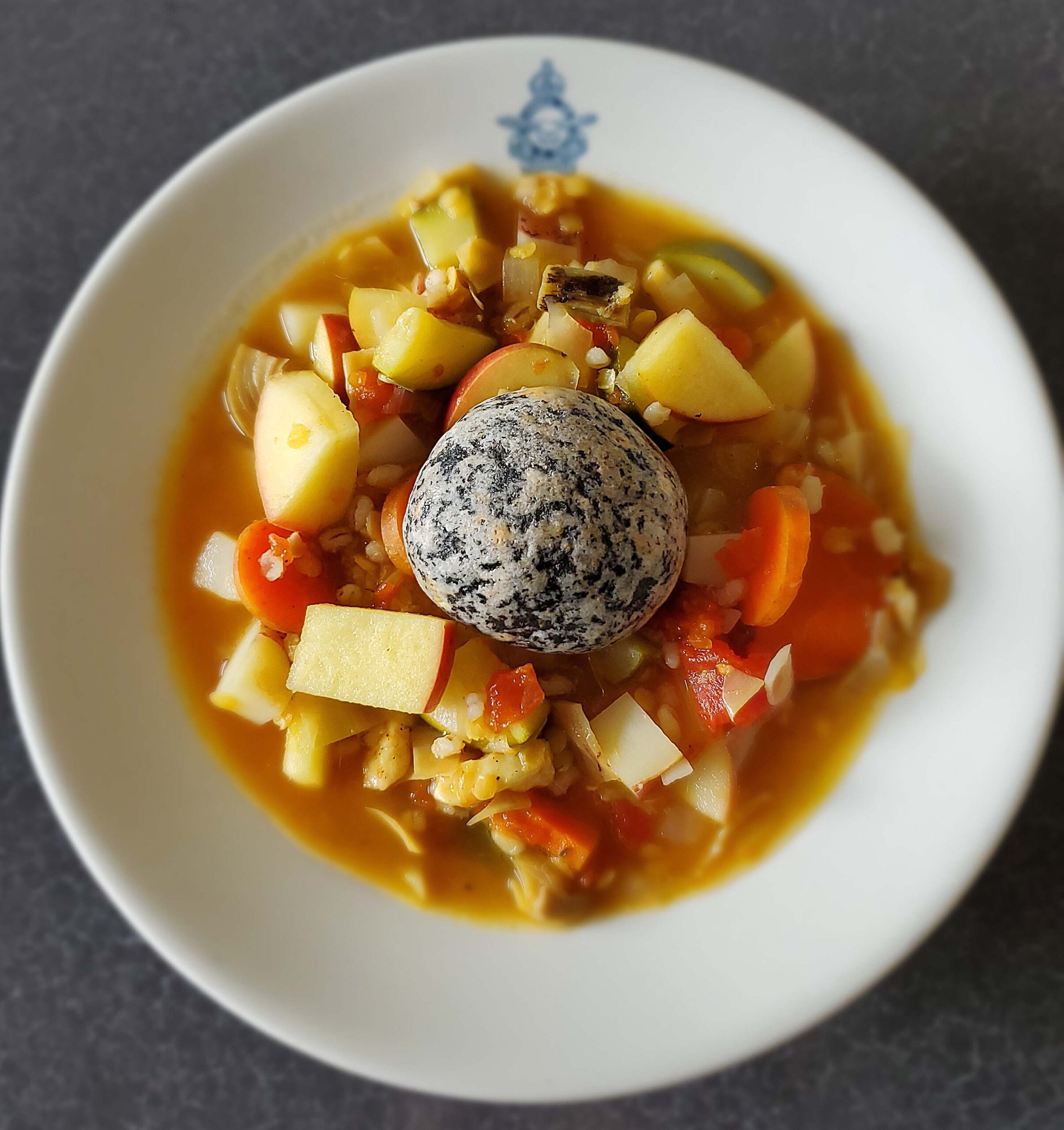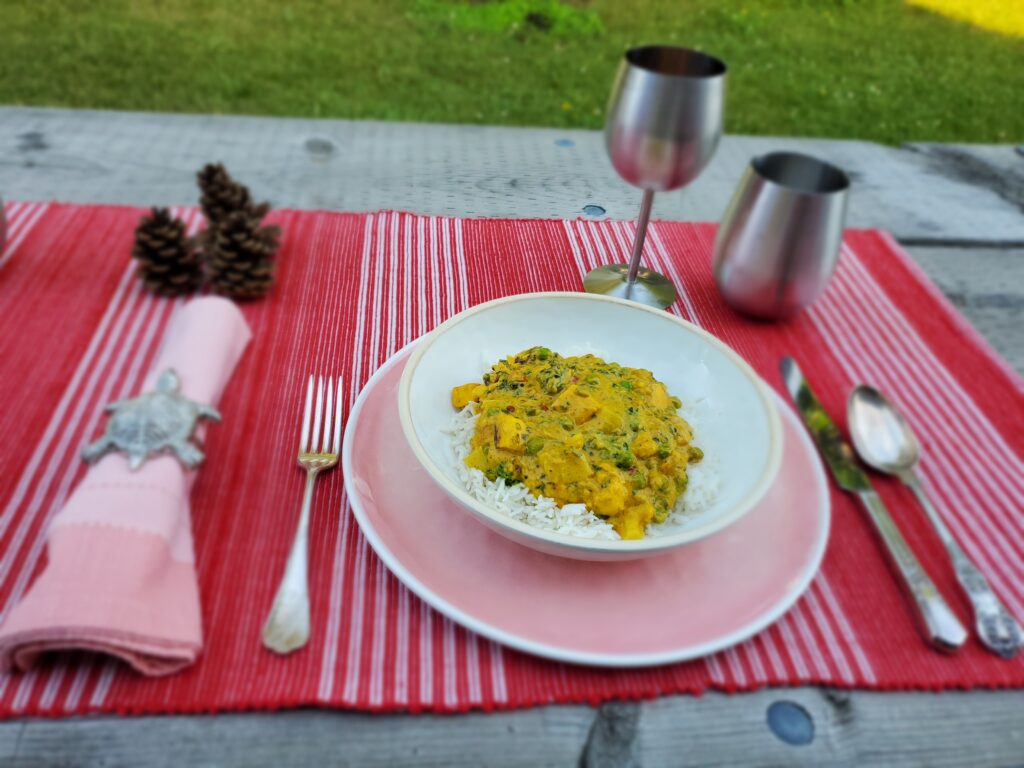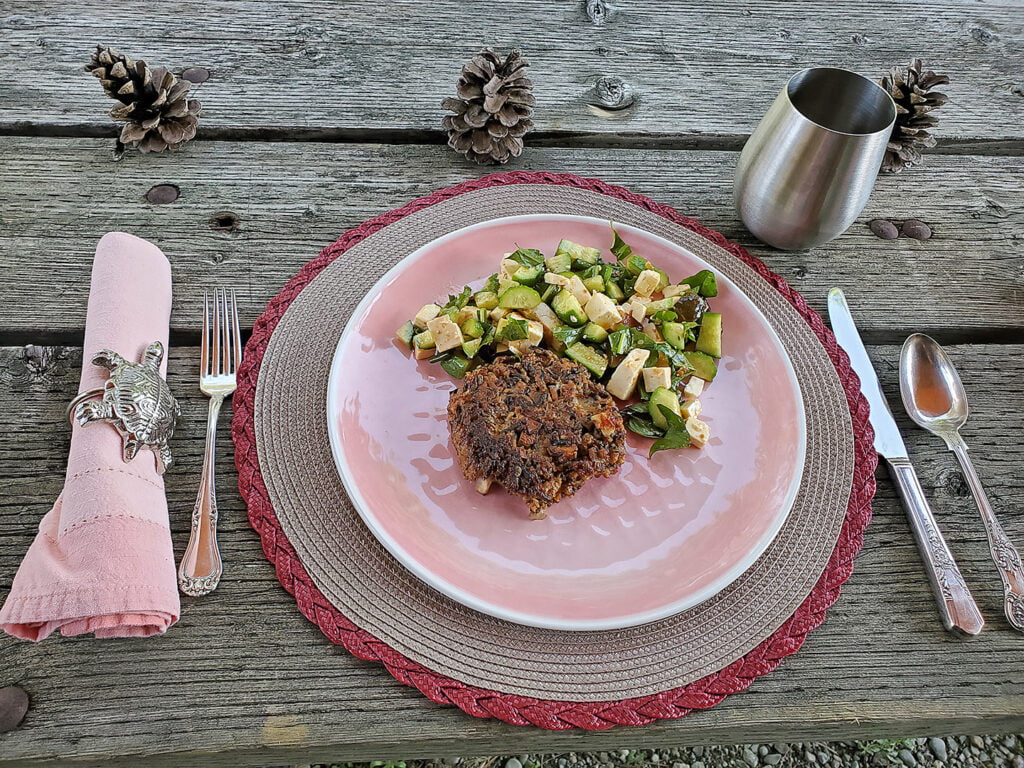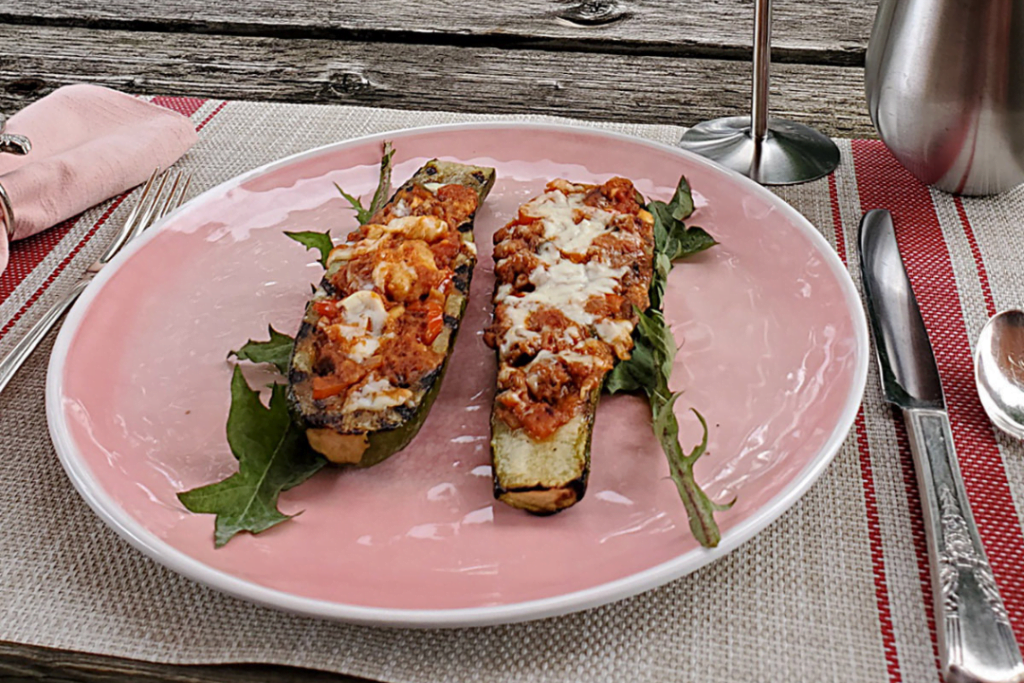One of our New Year’s resolutions is to continue to find ways to reduce our footprint when enjoying our RV adventures. Although we know it’s impossible to implement an entirely zero-waste RV experience in a 40-foot Class A diesel rig, we’re always looking for ways to reduce our impact on the scenery we love.
We’ve been learning more about the importance of moving to a circular economy in which nothing is wasted, an economy that retains and recovers as much value as possible by reusing, repairing, refurbishing, remanufacturing, repurposing, or recycling products and materials. According to the World Resources Institute, the world threw away 300 million tons of plastic in 2019, nearly equivalent to the weight of the human population. Predictions are that in the next two decades, there will be more plastic than fish in the ocean. Today’s global economy is built on the linear “take-make-waste” model where natural resources are extracted, used, and sent to landfills. In contrast, the goal of a circular economy is to ensure that our global economic wellbeing is not tied to environmental destruction.
Our challenge is to figure out what we can do on a personal level, as RVers, to make this happen.
When thinking about the 7 R’s for sustainable living (Rethink, Refuse, Reduce, Re-use, Repurpose, Recycle, and Rot), here are some actions we can take when RVing (and when we’re not on the road). We’d love to hear your suggestions!
Rethink what we need when we’re RVing: The limited storage space, working surfaces, and access to water and power on RV’s makes it easier for us to rethink how we consume resources. This means we can identify what we need at the very minimum while we’re on the road. It may mean that we shop at grocery stores every few days as opposed to doing one massive shopping trip ahead of time. By planning our meals in advance, we can be more intentional about what we bring onboard.
Refuse to buy overpackaged food: While it may be difficult to totally avoid any plastic packaging with our food, we can certainly take control by not purchasing food that’s overpackaged. When we can, let’s take advantage of the opportunity to buy things from the bulk bins. Even small actions like bringing our own net bags for bagging fruits and vegetables and buying concentrated or refillable products will reduce the amount of packaging. Since liquid laundry detergent contains as much as 80 per cent water, how about switching to powder laundry detergent which is more concentrated and doesn’t come in a plastic container?
Reduce The average Canadian consumer throws out about 25 per cent of their shopping cart each year. Food waste in landfills produces methane gas, a gas 25 times more damaging to the environment than carbon dioxide. As RVers, we can plan ahead and buy only what we need for our trips. We can freeze meals at home and bring them with us for our travels. We can be creative with leftovers and before we go shopping, use the food we already have.
Re-use Have you heard the phrase “Use it up, wear it out, make it do, do without”? Popular in the 20th century during war and the Depression, we think this message is equally applicable today. Here again is the opportunity to use whatever we have on hand and make something creative for dinner from remaining groceries or staples in the pantry. Many RV campgrounds have “Please help yourself” sections in their administration office. This is where you can drop off items that you don’t need and find those that you can use. Over the years, we’ve been able to pick up books, DVD’s, and even cleaning supplies left there by fellow RVers.
Repurpose Shopping for items for your RV from thrift stores for cooking utensils, gently used clothing and shoes, and even beach towels is a great way to keep the circular economy going. Our favourite is the Salvation Army Thrift Store. As Canada’s largest national clothing recycler, the Salvation Army Thrift Store diverted more than 32 million kilos from local landfills (the equivalent of 1400 recycling trucks), last year.
Recycle Observing Global Recycling Day on March 18 this year gives us an opportunity to rethink our approach to recycling. The best way to do this is to remind ourselves how to recycle correctly. Contaminated recycling costs millions annually in damaged equipment, workplace injuries at the recycling facility, and reduced value of the recyclables. Edmonton and Toronto have the highest rates of contamination which means that one-quarter of what’s placed in their blue bins can’t be accepted in their system. Emptying and rinsing food containers before recycling them helps to ensure that residue from items like jars and yogurt tubs don’t get soaked up by paper and ruin large batches of otherwise perfectly good recyclables. It’s also important to not place any black plastic in recycle bins. Most of the plastic in Canada is sorted by optical scanners. Black plastic doesn’t reflect light, and even if it has a recycling symbol on it, it can’t be sorted by the scanners.
Not all municipal and local recycling programs accept the same items. We need to familiarize ourselves with what’s accepted at different recycling depots on our travels and not assume that what we can recycle when we’re at home is what we can recycle elsewhere. This means that we may need to keep our recyclables with us during our trip and recycle them when we get home.
Rot Simply put, what’s left of food items that cannot be reused or repurposed, can be composted to turn food waste back into nutrient-rich soil. Easier said than done when it comes to RVing, but we hope that in the near future, we’ll be able to find more composting/green bin services at our travel destinations.
Stone Soup
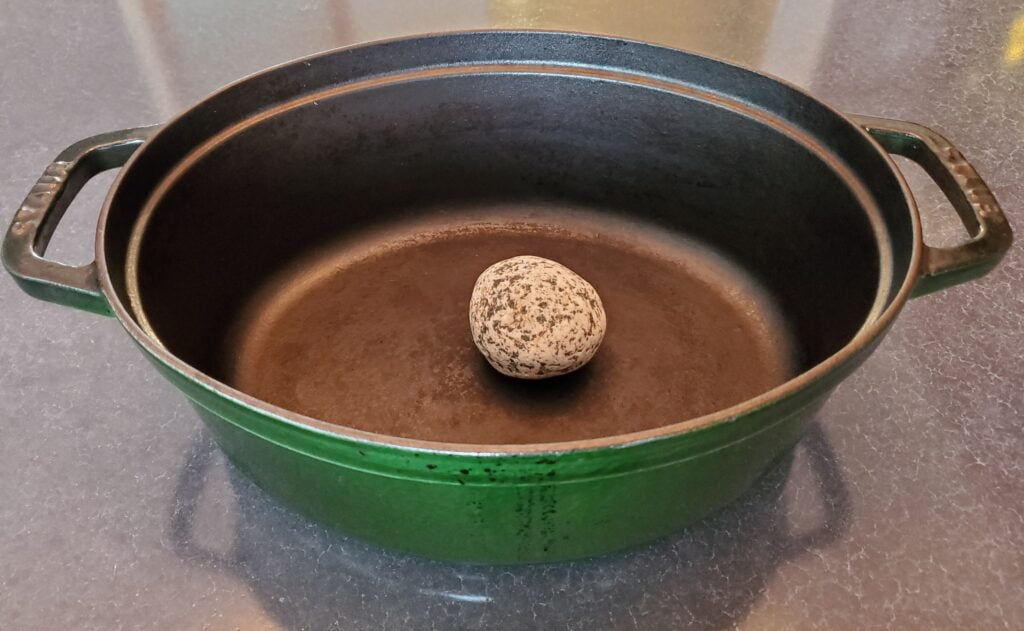
Photo Credit: Gail and Martin Aller-Stead.
A perfect recipe for the circular economy and observing Global Recycling Day is Stone Soup. What a great way to meet your RV neighbours by inviting them to bring something to enhance the flavour of the stone (and to stay to enjoy it!) All amounts are mere suggestions. Add, subtract, change, as you wish with whatever you have at hand. You’ll need one large pot and a medium-sized stone.
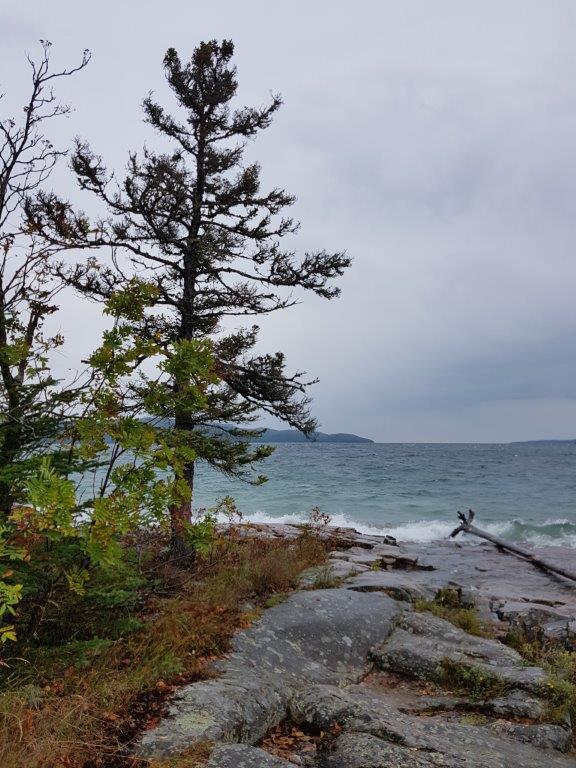
Photo Credit: Gail and Martin Aller-Stead.
The special ingredient – the stone — is from Agawa Bay Campground, located on a three kilometre beach on Lake Superior.
Ingredients
- 1 medium stone
- 15 ml butter
- 2 cloves garlic, peeled, finely diced, and with anima removed
- 1 onion, finely diced
- 15 ml cumin seed
- 150 ml halloumi cheese, medium diced
- Whatever else you have in the kitchen that day, such as:
- 1 tin tomatoes
- Left-over pumpkin puree
- 1 medium red potato
- 1 large carrot
- 1 medium zucchini
- 1 apple
- 125 ml pot barley
- 125 ml lentils
- 2 litres of vegetable or chicken stock
- 150 ml shredded hard cheese
- Salt and pepper, to taste
Method
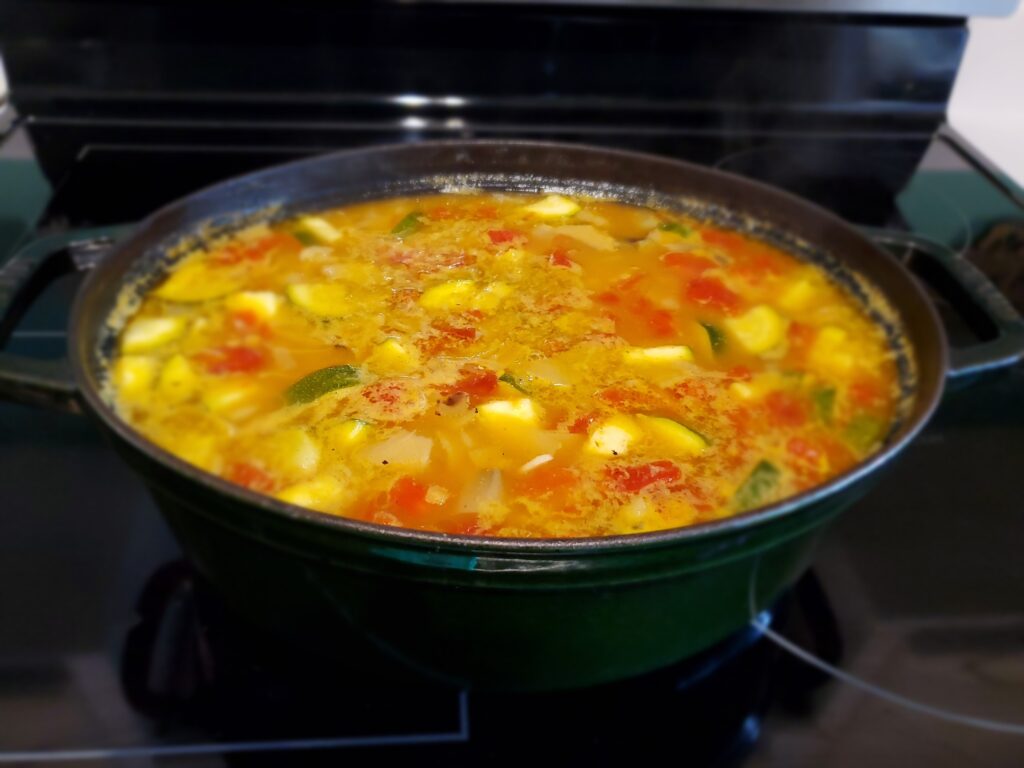
Photo Credit: Gail and Martin Aller-Stead.
- Clean, prepare, and set aside the vegetables and the apple: Cut carrot into coins. Cut zucchini into lengthwise quarters, then cut into 5mm cross-slices. Cut potato into 1 cm dice, skin on. Cut apple into thin, small slices, removing the core and keeping the peel on.
- Open the tin of tomatoes.
- Heat the butter in the pot to melt.
- Add cumin seed to butter and cook for 1 – 2 minutes, until fragrant.
- Add garlic mince to butter and stir to coat.
- Add onions to butter and stir until softened.
- Add halloumi to butter and stir to coat.
- Add carrot, potatoes, and zucchini to butter and stir to coat.
- Place the stone in the pot and add the stock. Bring to a gentle simmer.
- Stir in the barley, lentils, tinned tomatoes, and pumpkin purée and let simmer (lid slightly ajar) for 25 minutes.
- Add apple for the last five minutes of simmering.
- Season to taste with salt and pepper.
Remove the stone and serve in wide soup bowls, topped with small amount of shredded old cheese.
Keep positive, test negative, and bee kind!

